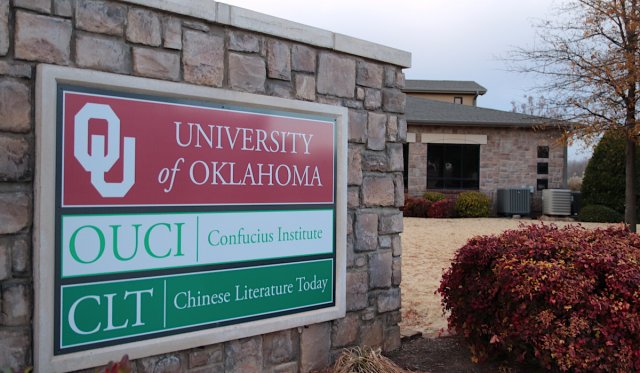
WASHINGTON — A Senate investigative report revealed that Chinese recruitment programs are stealing U.S. research and that federal agencies have haltingly responded to these threats.
China has strategically acquired intellectual property from U.S. researchers funded by U.S. taxpayers through talent recruitment programs.
This story was reported by Gaylord News, a Washington reporting project of the Gaylord College of Journalism and Mass Communication at the University of Oklahoma.
The report also included that a Chinese funded education and cultural program known as the Confucius Institute is being used to spread propaganda on U.S. college campuses.
The Permanent Subcommittee on Investigations of the U.S. Senate Committee on Homeland and Governmental Affairs said that it found the U.S. government inadequate with recognizing these threats and that it’s lacking efficient strategies to better secure U.S. research.
“These talent recruitment programs are a win-win for China,” said U.S. Sen. Rob Portman (R -OH), the chairman of the subcommittee.
Portman warned the Confucius Institute program has been a growing threat for some time.
Founded in 2004, the Chinese government operates hundreds of Confucius Institute programs to promote and teach Chinese culture and language around the world.
Unlike similar programs operated by European countries, the Confucius program is on college campuses.
The OU Confucius Institute (OUCI) program was established in 2006 and claims itself as one of the most comprehensive Confucius Institutes in the nation.
Through the funding provided by the Confucius Institute Headquarters, OUCI allows students, professionals and researchers to study, visit, and conduct research in China, according to its website.
The Senate subcommittee investigation focused on China’s most prominent program, the Thousand Talents Plan. The plan was launched in 2008 to recruit 2,000 researchers from around the globe.
By 2017, China exceeded its recruitment goal to more than 7,000 members.
FBI investigators visited University of Oklahoma and Oklahoma State University campuses over the summer to determine the extent at which some faculty were working with the Thousand Talent program. OU employees were warned in an email not to talk to investigators without first contacting university lawyers.
According to the program’s website, its aim is to “gather the global wisdom and create the China great exploit.”
In exchange for salary and research funding, members sign contracts with these Chinese institutions to prevent talent plan researchers from disclosing their participation in the program.
The Department of Energy plays a prominent role in advanced research, which makes it valuable to the Chinese government. It is the largest federal sponsor of research in physical sciences. Most of the research occurs in the Department’s National Labs.
The subcommittee reported that a Thousand Talents Plan member used intellectual property from a lab and filed for a U.S. patent under the name of a Chinese company, claiming U.S. government-funded research as its own.
On a separate occasion, another member downloaded more than 30,000 files from a National Lab without authorization before returning to China.
It was not until 2018 that the FBI took control to respond to the threats posed by the plan.
Assistant Director of the FBI’s counterintelligence division, John Brown, said that it’s essential for the FBI to continue protecting American research from unfair exploitation while ensuring that academic and business environments remain free and open.
Currently, the FBI’s Office of Private Sector engages with universities and businesses to allow exchange of information about cases, threats and trends.
Just last year, the National Institutes of Health (NIH) started reviewing its grants for connections to the Thousand Talents Plan. NIH found grant fraud, theft of intellectual property and violations of the peer review process by sharing confidential grant applications.
The NIH currently monitors concerns with federal agencies like the FBI, to exchange information on emerging threats in order to mitigate security breaches.
Additionally, NIH improved its electronic systems used by researchers to submit applications to NIH.
In July 2019, the National Science Foundation, or NSF, prohibited its employees from joining talent recruitment programs. However, the policy does not apply to the more than 40,000 NSF funded researchers who are most likely to be members of a talent recruitment program, said Portman.
The NSF still doesn’t have any employees dedicated to grant oversight.
The Office Head of NSF’s Office of International Science and Engineering, Dr. Rebecca Keiser, said NSF works closely with partners in academia, the federal law enforcement agencies and the Administration to identify and address foreign threats to taxpayer-funded research.
Keiser testified that the individuals violating laws and policies represent a small proportion of scientists working in and with U.S. institutions.
“What we need to do is increase awareness at universities of the obligations that, unfortunately, some researchers are signing up to,” she said.
However, Portman said he wasn’t hopeful that the threat would go away, “I think it is only going to increase unless we do things differently,” he said.
While participation in a talent plan is not considered illegal, in some cases it has resulted in violations of U.S. laws, including economic espionage, theft of trade secrets and grant fraud.
In response to the report, Dr. Kelvin Droegemeier, the Director of White House Office of Science and Technology Policy, said in a statement that research must be done ethically and without foreign government influence.
“I look forward to shaping a solution that will ensure research integrity for industry, academia, and federal agencies,” Droegemeier said.
Full report on Chinese recruitment programs
(Clarification: This article was updated at 10:45 a.m. Wednesday, Nov. 27, to use a more accurate quote from Keiser and to correct one spelling of her name.)






















